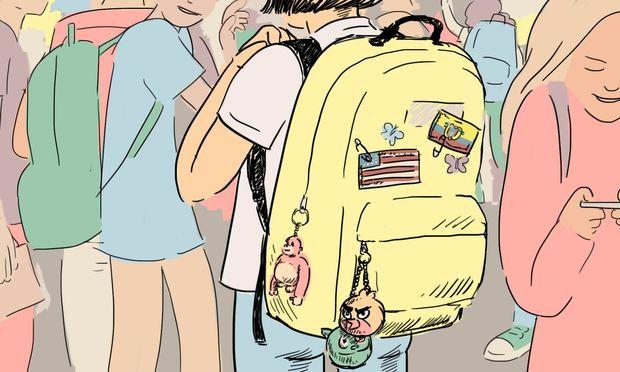Becoming a storyteller helped this teen from the Bronx become herself
Mmachi Dimoriaku performs at the Moth High School GrandSLAM in December 2015. She'll be performing tonight at WNYC's Greene Space tonight, in an event about young immigrants in New York City.
There are approximately 80 million immigrants or native-born children of immigrants in the United States. And the relationships between these generations of migrants can make life as a teenager here complicated.
It’s something Mmachi Dimoriaku has struggled with. She’s 18, a senior at DreamYard Preparatory School in the South Bronx, a child of immigrants and a passionate storyteller. Performance helps her share and understand her many identities.
“I was born in America, but my family comes from Nigeria,” she says. “Whenever I go back home [to Nigeria], I’m considered African American, but whenever I’m over here, it’s like, ‘Oh yeah, you were born here, but, your family is from Africa — it’s from the motherland; another country.’ I’ve always had that hard sense of, ‘Where do I come from?’ I’m stuck in the middle between these two worlds.”
Dimoriaku says that she has had to protect and defend her identity as a black American and a Nigerian.
“It was in my black box theater in my ninth grade classroom and this one boy stood up and just randomly started violating all the Africans — calling them names that you’d hear from an idiot on the street,” she says. “Before anybody said anything to stop him, I stood up and looked him straight in the eye and said, ‘Don’t violate my people.’ When I said that, I felt like a release — a release from all the tension that I’ve felt over the years.”
ALSO: What’s it like to be the new kid AND a refugee?
In the years since, Dimoriaku has found more ways to claim her identity.
“I’ve been able to just allow myself to be… myself,” she says.
She used to call herself Victoria, Veronica, Vanessa — now she goes by the name on her birth certificate.
“Victoria was very, um, I would say a wild child,” Dimoriaku says with a laugh. “She definitely did not care at all what other people thought, and she did her own thing on her own rules and terms.”
The real Mmachi Dimoriaku, she says, is much calmer and sometimes even a little shy. It’s through storytelling that she’s been able to realize her true self.
“It gives me the voice that not a lot of people in my situation get,” she says. “It allows me to tell things about my life that not a lot of people get to hear. My experiences kind of help other people to tell their own stories, and be expressive and open in telling their own.”
Though she is finding her voice, Dimoriaku says it is still hard being a child of immigrants in America.
“At a point, you are from this country that you love and care about deeply, but you are also beginning to understand the different parts of this new world. And people don’t like you in this new world because they think that you should go back to ‘where you belong,’” she says.
Dimoriaku says she feels the push back from both new immigrants and those that have been here for years. The feeling of being “other,” she says, also comes from black Americans.
“When I talk about my family experience sometimes it’s, like, considered funny because my parents had a completely different experience back home in Nigeria than people who were born and raised over here,” she says. Her friends talk about their family and parents in context of the civil rights movement in America.
At DreamYard Preparatory School, there were problems at first, she says.
“Most of my school is either first- or second-generation. At first there was a real divide between us. Between all the students of color,” she says.
Over the years, the students have come together to become a community, thanks in part to educators who have fostered a supportive environment, she says.
“You can go to a teacher and you can talk to them about how you feel, and you can let them in on your life story and you wouldn’t feel shunned or hated,” she says. “And a lot of my classmates are really respectful to me when it comes to that stuff, and I’m respectful to them.”

The article you just read is free because dedicated readers and listeners like you chose to support our nonprofit newsroom. Our team works tirelessly to ensure you hear the latest in international, human-centered reporting every weekday. But our work would not be possible without you. We need your help.
Make a gift today to help us reach our $25,000 goal and keep The World going strong. Every gift will get us one step closer.